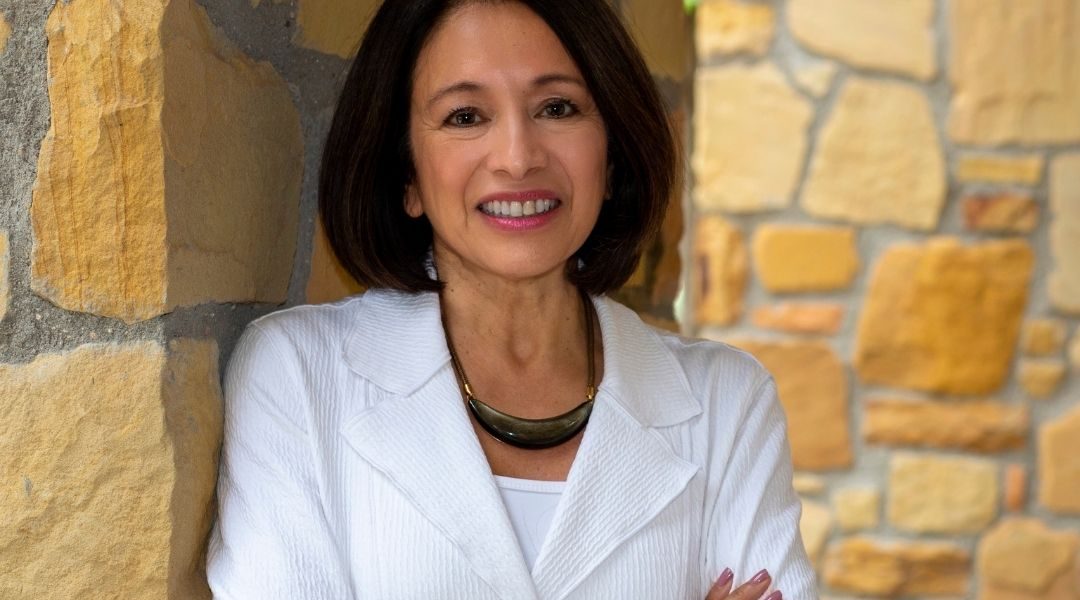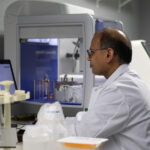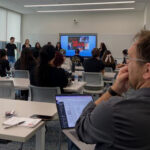Editor’s note: This story was updated at 11:43 a.m. June 8 to include Dr. Adriana Contreras’s previous employement at Texas A&M University-San Antonio.
The Mays Center for Experiential Learning and Community Engagement has a new executive director. Dr. Adriana Contreras, who is also associate vice president, began the job on June 1.
She replaced Edwin Blanton, former associate vice president and executive director of the Mays Center, who was active from 2016-2022. He is now working as assistant vice provost at the University of Texas at San Antonio.
The Mays Center is an experiential lab that offers career resources to students, such as interview and internship guidance. Located in Room 111 of the science and technology building, the center was built under the oversight of Blanton.
Contreras said her priority is to continue nurturing career-ready and community-minded students.
To do that, Contreras said the center needs to work with employers to provide work opportunities to students. It also means working with faculty to organize service-learning and experiential-learning projects.
“My vision is to help move that work forward and see how we might expand upon the work that’s already being done here,” she said in a June 3 interview.
“I know the students want those opportunities, and so we just need to see how we make that happen,” she added.
For Contreras, there is a symbiotic relationship between a learning institution and employers in the community because employers receive the benefits of career-minded employees while students receive the experiential learning they need to develop professional skills.
Informing students of the center’s resources is important to Contreras. She said the center has a strong social media presence, which students can take advantage of. The center can be found on Instagram, Facebook and Twitter. Alternatively, the center can be found at its university webpage and on JagSync.
The center presents during new student orientation, but outreach also needs to be done through word-of-mouth, Contreras said.
“It’s (about) being out on campus; it’s having a presence where the students are,” she said.
For Contreras, the most ideal scenario would be having every student on campus know about the center and its resources.
“That’s why we’re here,” she added. “We’re here to help the students.”
At this point, Contreras has already seen just how supportive the center’s staff can be.
“I know that just in the short time I’ve been here, I know that a lot of the staff here are very focused on helping the students in many, many, many ways,” she said. “Students come to appreciate that because they sense that commitment.”
Some of that assistance includes: refining resumes, interviewing skills, finding proper attire for an interview as well as internship research.
Contreras previously worked as senior director of youth services at Goodwill Industries of San Antonio; she has also worked as executive director at the San Antonio Education Partnership and as deputy to the chancellor of the Alamo Colleges. She has a Ph.D. in higher education from the University of Texas at Austin.
She also has previously held other positions at this university:
- Director of marketing and communications — August 2020-April 2021.
- Director of administrative services — April 2021-December 2021.
- Interim vice president for university relations and advancement — January-March 31.
- Director of administrative services — April 1-May 31.
Dr. Mari Fuentes-Martin, vice president for student success and engagement, oversaw the selection process, which was composed of three open forums in late May. Candidates Dr. Marita Esposito and Chad Williams were also running for the position.
For Fuentes-Martin, it was key to hire someone who could follow in the steps of the former executive director, Blanton.
“Replacing Edwin was going to be a really big challenge because his leadership for that department had brought it to where it is today,” she said in a May 31 interview. “I want to say that I was looking for a new Edwin, but at the same time, nobody can really do that.”
Martin-Fuentes said she needed to pick someone who can build upon the work Blanton did: building a relationship between career services, experiential learning and employee relations.
The other key piece is the associate vice president title, she added.
Fuentes-Martin said this position is meant as a “thought partner” to help her look at the needs of the student success and engagement division and move it forward.
“I think Adriana is talented in both of those areas,” she added.
Her many years of experience at the Alamo Colleges and nonprofit organizations made her “the best candidate,” Fuentes-Martin said.
Ultimately, Fuentes-Martin said she wants Contreras to focus on students’ career-readiness. The career-ready mindset is integrated from the moment students take their first-year seminars and it needs to continue through graduation so that students feel ready when they step out of the school.
The experiential learning — the internships, research, shadowing professionals, employer recruitment events, to name a few — will be the tool that strengthens that sense of career-readiness, Fuentes-Martin said.
Contreras needs to be “very intentional” about experiential learning, she added.
Fuentes-Martin also said another goal for Contreras is to create more opportunities for more economic prosperity in the community.
“I think she can be creative and innovative and works very strongly as a team member and a team leader,” Fuentes-Martin said.
For Blanton, the biggest strengths of the center are what he calls its mission and composition.
“So combining the three areas of civic engagement, experiential learning and career services really functions really well and also really does look at the whole student, right?” he said in a May 24 interview.
The second component is its “strong, dedicated team.”
“They really are an A-team,” Blanton said.
Blanton said Contreras will need to continue the “strong mission” that was started. Because of the pandemic, Contreras will have to “sense” the health of the economy and labor market to make proper decisions.
“I’m sure they’ll keep that in mind as well — the post-COVID realities of the world and how to prepare students for that,” Blanton said.
Working at the center was “an experience of a lifetime” for Blanton.
“When I started, the Mays Center was just a concept,” he said.
With only four staff members and a budget of about $300,000, Blanton managed the expansion of the center to have its own space in the science and technology building. Now, the center has at least 15 professional staff members and work-study students and an annual budget of about $2 million.
Expansion is also something that Blanton said he adopts into his career path, having transitioned to UTSA.
“It was just time,” he said. “The Mays Center is such a high-functioning team, and everything was going so well. I felt it was a good professional move for me to go build something new elsewhere.”







